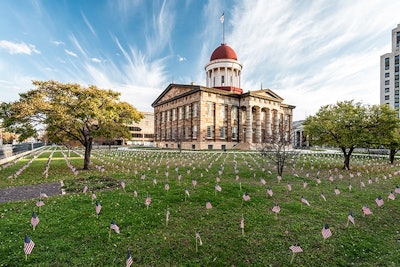
Illinois lawmakers officially filed legislation May 6 to legalize and regulate adult-use cannabis, and the bill outlines a set of robust expungement and social equity provisions, according to Chris Lindsey, senior legislative counsel for the Marijuana Policy Project.
Senate Bill 7, introduced by Sen. Heather Steans (D-Chicago), directs the state to undergo a very detailed process of identifying and expunging the records of those with qualifying cannabis-related offenses, which include possession of up to 30 grams, sale of up to 30 grams and cultivation of up to 20 plants. Should the legislation be signed into law, a court order will be issued to provide clerks of court and law enforcement agencies with specific instructions on expunging qualifying records.
“It’s going to probably take a little while because they’re going to have to do quite a bit of research and there are a lot of folks … who will be impacted,” Lindsey said. “It’s also going to be possible for people to initiate their own [expungement], if they want to make sure they can get their records cleaned up sooner rather than later. … It’s pretty remarkable.”
The bill also includes social equity provisions that provide benefits to those who have been directly impacted by the war on cannabis. An individual who has been arrested, charged with or convicted of an offense that will be expunged under the new law—or an individual whose family member has been arrested, charged or convicted—qualifies as an equity applicant in the adult-use cannabis business licensing process. Business hopefuls who reside in a part of the state that has been disproportionately impacted by the war on cannabis—through higher rates of poverty than the rest of the state or disproportionate arrests and convictions of cannabis-related offenses—will also qualify as equity applicants. These applicants, when forming a business that is 51-percent owned by individuals in these categories, will receive additional points on their applications.
“They can also qualify for financial assistance,” Lindsey said. “If they need help with loans or training, there’s a fund that’s going to be established. … It’s ensuring that they have access to the licenses and also that there’s financial assistance for those businesses.”
Applicants who are awarded licenses during the state’s transition from a medical-only to an adult-use market will pay an additional fee, beyond the licensing fee, that will create the fund for the equity program.
“Several weeks ago, when the governor’s office started getting involved and we started looking at how we define the class of people that would benefit from all of this, it really did come back to: This is about making up for the harms caused by the war on marijuana,” Lindsey said. “It’s absolutely within the structure of this bill.”
The legislation also allows home grow, which Lindsey said the state’s cannabis community supports, while law enforcement groups may want the provision modified or even removed.
The bill outlines a business licensing process where existing medical cannabis licensees can transition to the adult-use market, expanding their cultivation operations and retail locations to accommodate the new customer base.
“That license will be available very, very quickly after the bill passes, with an aim toward sales beginning Jan. 1, 2020,” Lindsey said.
"This is about making up for the harms caused by the war on marijuana. It’s absolutely within the structure of this bill.”
-Chris Lindsey, Senior Legislative Counsel, The Marijuana Policy Project
During the drafting process, lawmakers worked closely with the various government agencies that would be tasked with regulating an adult-use cannabis industry in the state, ensuring that all rules were outlined for them in the final bill. This will allow sales to launch fairly quickly if and when the legislation passes both chambers of the legislature and is signed into law by the governor. (The Illinois legislative session adjourns May 31.)
“Then the dispensaries can also begin an expedited process to get a second location as a retail outlet, and that will be dedicated exclusively to the adult consumer market. So, in other words, it’s not another medical dispensary,” Lindsey said. “That will happen in the months after the sales begin.”
Processing, transporting and craft grow licenses will be new additions for the adult-use market, he added, and the regulatory agencies will work to make the applications for these new license types available as soon as possible. The craft grow license will allow a cultivator to operate much like a microbrewery, Lindsey said, where cultivators can produce product on-site and sell it directly to consumers.
“I think it’s going to have a lot of appeal because they can develop a brand, and it’s just an interesting thing,” he said. “I can’t wait to see what people do.”
The state will cap the number of total licenses issued, and the limit will be determined by the various regulatory bodies, Lindsey said.
Lawmakers are largely still reading through the 500-page bill, he said, but it will soon be assigned to a Senate committee. Rep. Kelly Cassidy (D-Chicago) will likely introduce an exact duplicate of the bill in the House, Lindsey said, allowing both chambers to work on it in tandem. A public hearing will be on the horizon, he added, where lawmakers will hear testimony, and full floor votes will soon follow.
“We want both chambers to pass the bill by the end of May so that the governor will sign it,” Lindsey said. “There are going to be some areas of the bill where we expect some pushback, but so far, we’re not sure exactly how that’s going to play out. We’re just going to be back in the mode of ushering it through as quickly as sponsors are able."

























